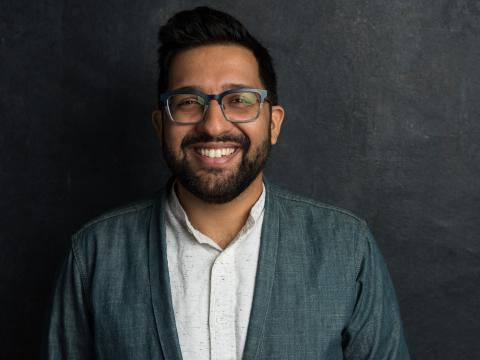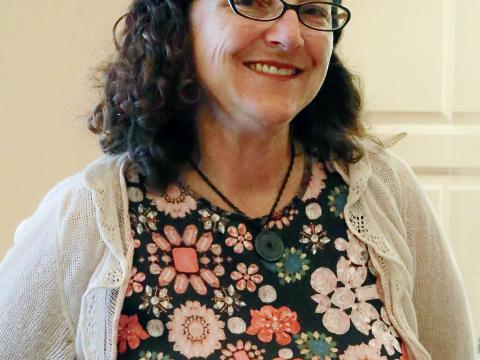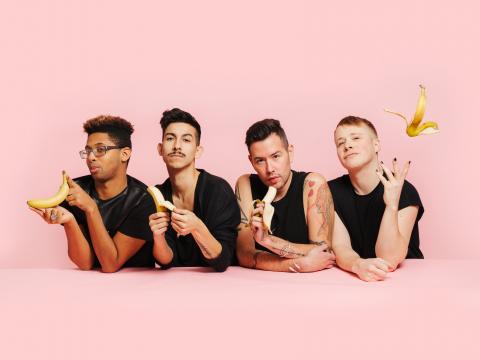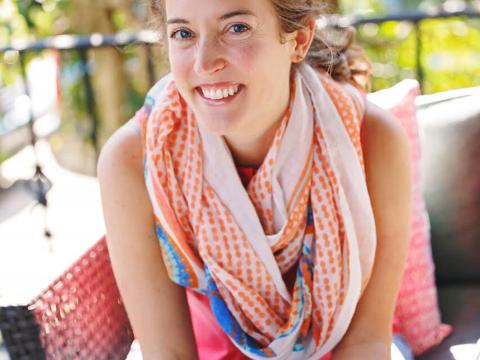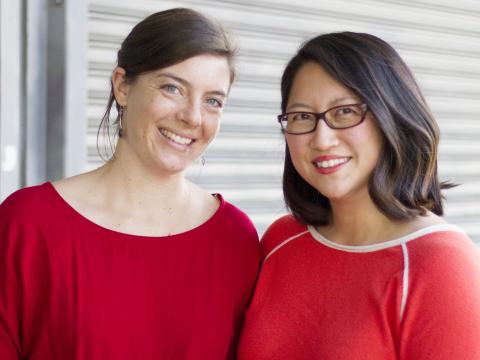Podcasting on the Rise
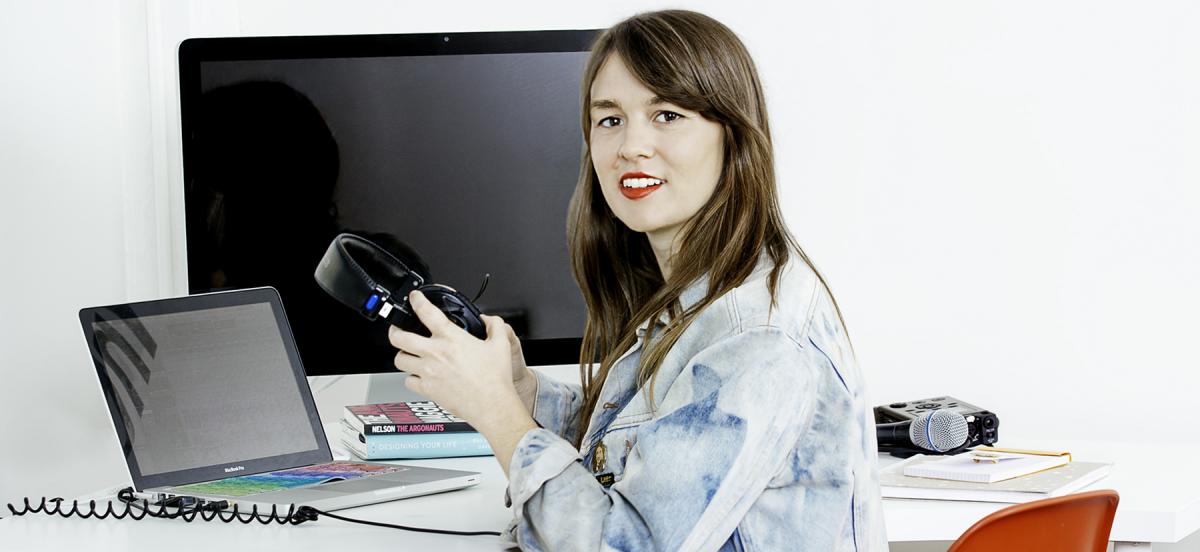
Gina Delvac ’08 is the Los Angeles based producer of Call Your Girlfriend and other podcasts, and has been an adviser to several Ford podcasters. Photo by Describe the Fauna.
Details
Podcasts have become one of the world’s most popular ways to tell stories, share information, and tackle challenging issues. We spotlight some Haverford alums who have plunged into the field.
For more than 18 months, Gina Delvac ’08 produced the podcast Call Your Girlfriend without pay, because she was passionate about helping smart and kind people speak in their authentic voices—and be heard.
“Questions I ask myself about a new project include, ‘Will I enjoy working with this person? Does she have something to say? Is her perspective smarter, more nuanced, or different from what’s already out there?’” Delvac says. “You’ll notice I use the word ‘her’ because the cleverest people who seem to get skipped over are women, women of color in particular.”
Three years and 130 episodes into its launch, Call Your Girlfriend regularly attracts 150,000 listeners per episode. The show is framed as a back and forth between real-life friends Aminatou Sow and Ann Friedman on topics ranging from politics to pop culture to “pelvic power.” The show sometimes includes interviews with “a roster of women you wish you could call for life advice,” as a 2016 article in The Guardian noted. One recent guest? Hillary Rodham Clinton.
“It’s meant to be a thing that you share with someone you really care about, like how a mixtape or a zine used to be,” says Delvac, who is an equal partner in the podcast with the two hosts. She now earns about half of her yearly income from the show, which takes up about half of her freelance work time.
Podcasts—digital audio files available for downloading, usually offered as a series and built around a theme—have become one of the world’s most popular ways to tell stories, share information, and prompt discussion on even the most challenging issues, such as race and religion. In recent years, the number of available podcasts has grown tremendously. So have audiences.
Since 1998, the Infinite Dial report, issued by Edison Research and Triton Digital, has analyzed digital media topics with a survey of 2,000 people. The 2017 report showed that 40 percent of Americans age 12 and up say they have listened to a podcast. That’s up from 29 percent in 2012 and 36 percent last year.
“There’s an excitement and energy around podcasts that has brought in a new audience for radio and for audio generally,” says Jennifer Waits ’89, who has been volunteering in radio since her student days at Haverford and has written for the blog Radio Survivor since 2009. Waits is also part of the team behind the Radio Survivor podcast, which has addressed the culture of radio since 2015. Podcasts, she says, have “provided an entry point for people who might not be as immersed in radio.”
For Katrina Schwartz '08, a journalist at NPR member station KQED in San Francisco, co-hosting the MindShift podcast was a natural extension of her work and her interest in the future of education. Certified nurse midwife Amy Alspaugh '07, co-host of The Peach: Lady Smarts About Lady Parts, has used podcasting as a way to share critical women’s health information. Dennis Norris II '08 started the podcast Food 4 Thot with three friends after they were told they were often the most entertaining people in a room.
“Podcasts barely existed when we graduated,” says Delvac, who also produces the podcast Pitch Makeover and works on other podcasting projects. Still, she believes her Haverford education prepared her for the challenges of the genre.
“A lot of liberal arts grads do well in start-ups and entrepreneurial endeavors because we enjoy research and discovery,” she says. “We think critically and creatively. We pick up the new skills we need along the way, especially if it’s in service of an idea or mission we care about.”
Podcasts aren’t new to Haverford. In 2007, faculty members recorded podcasts about different books listed in the college’s 1836 library catalog to support a Magill Library exhibit. Haverford Athletics began releasing podcasts focused on student athletes, coaches, and administrators in 2015, offering more than 30 episodes on iTunes before switching to video content last year.
Haverford’s radio station—one of the country’s first college stations, launched in the 1920s—has struggled in the internet age and at one point, between 2009-10, became a podcast-only DJ club. The station, now run by Haverford and Bryn Mawr students, is a “web-based collective of audio content and multimedia,” its Facebook page notes. That includes podcasts.
Podcasts have existed since the early 2000s. The term first appeared in print in 2004, when a writer for The Guardian newspaper joined “pod,” from Apple’s iPod, with “cast,” a broadcast reference. But many credit NPR’s investigative podcast Serial, first released in 2014, with pushing the genre to new heights. With two seasons complete, Serial has had more than 230 million downloads.
While comprehensive data on the rise of podcasts is tough to come by, one study published on the website Medium calculated that the number of podcasts on iTunes (the dominant podcasting platform) as of June 2015 totaled around 206,000. The study further estimated that around 5,000 new podcasts were added to iTunes per month in 2015. Meanwhile, in 2016 Apple announced that its iTunes Store had surpassed one billion podcast subscriptions.
Why do podcasts appeal to so many? One answer: People want content on demand, instead of being tied to a fixed broadcast slot.
“I can listen to a podcast while doing something else,” says MindShift podcast co-host Schwartz. “It’s really nice to learn something or have a story told to you while you’re washing dishes or taking a walk.”
Schwartz got her start in radio because of Delvac, a good friend from Haverford who encouraged her to take a radio internship. One of the first podcasts she regularly listened to, she recalls, was NPR’s Planet Money, which began the year she graduated.
“Podcasts allow you to find what you care about and listen to people who know about that [subject],” she says. “You can find a podcast for anything.”
That’s because almost anyone can record a podcast and offer it to the masses via the internet. But not all have the high production values that appeal to listeners.
“Making a podcast isn’t that hard, but making a good one is,” Schwartz says.
Alspaugh, who works as a nurse midwife for the Durham County Health Department in North Carolina, says she and two other medical professionals launched The Peach: Lady Smarts About Lady Parts last January to address some of the women’s health misinformation they heard while on the job. “I hear stuff from my patients, but I also hear stuff from my friends who went to Haverford,” Alspaugh says. “When it’s your whole world, you forget that not everybody knows what you know.”
The Peach has thus far averaged one 30-to-45-minute show each month. Episode titles include “IUD, Yeah You Know Me” and “The Girls,” which is illustrated on the podcast’s website with a buxom photo of singer Dolly Parton.
“We bought a microphone and a recorder and said, ‘Let’s give it a try,’” says Alspaugh. “We record it at each other’s homes. You can tell it’s not done by NPR.”
Since all three women have full-time jobs, this is a self-funded side project—Alspaugh estimates they’ve put in a combined $1,000 so far, not including the cost of their time. Still, she believes it’s worth the effort.
“Our goal is to start more conversations about things that often aren’t talked about,” she says. “We want [listeners] to feel educated and empowered when they make health-care decisions.”
Norris and three friends launched their podcast Food 4 Thot in February. (The spelling of “thot” refers to an acronym for a raunchy slang term.) Each episode features a roundtable-like discussion on topics that can make people laugh but also spark deep conversations, “like a radio version of The View, but not terrible,” says Norris. The quartet—all are gay and three are people of color—met while participating in a writing workshop at Reed College in Portland, Ore., in 2016.
“There were probably 300 people there, and we came together immediately and became great friends,” Norris says. “We would get glasses of rosé and talk writing and craft, and everything from Mariah Carey’s Vine account to critical race theory to the publishing industry. During one conversation, it was me who said, ‘We should broadcast these conversations because they’re amazing.’ ”
After seeking podcasting guidance from Delvac, Norris and his co-hosts rented studio space so they could offer a professional-sounding product. They had a photographer friend take pictures of them for their press kit and website, and built excitement for their show with a trailer and social media posts.
The first episode of Food 4 Thot was called “Like a Virgin” and was built around “first times,” including “first times seeing ourselves in literature, first times questioning religion, and first times accepting Beyonce as our Lord and Savior.” The show got 20,000 downloads, a magic number in podcasting as that is the number advertisers look for, and there has been interest, Norris says. “It’s so hard to make money off of a podcast, but we thought we could. To be able to make a living podcasting and writing is a dream.”
Just six months in existence, and with only nine episodes, Food 4 Thot has been named to several best-of lists for 2017, including the website Vulture’s “The Best Podcasts of 2017,” NBC News’ list of “11 LGBTQ Podcasts You Should Know About,” and GLAAD’s list of “11 Podcasts to Subscribe To.”
The show has a large LGBTQ following, Norris says, but also has found fans among women, millennials, and college students who identify as left of center politically. “My Haverford community has been incredibly supportive,” Norris says.
Ahmed Ali Akbar was considering a career in political science or medicine when he came to Haverford in 2006. Then he felt the pull of the college’s lauded Department of Religion and changed his focus. He and a friend then dabbled in campus radio, hosting Muslim Power Hour. (Akbar transferred to the University of Michigan after four semesters due to a family illness, but he remains in touch with Delvac and Norris and says his “besties” are all Haverford folks.)
More than a decade later, Akbar, who went on to get a master’s degree from Harvard Divinity School, is the host of BuzzFeed’s popular podcast See Something Say Something. Named to a 2016 “best” list by The New York Times, Akbar’s show focuses on Muslims in America, addressing complex issues, such as cultural appropriation, and more lighthearted ones, like the bond that strengthens between hungry friends during Ramadan fasts. Says Akbar, “The goal of my podcast is to give our listeners a better way of talking about and addressing ‘Muslimness’ in America.”
Personality matters in podcasting. Having a big name anchor a show is always a good thing. Well-known criminal defense attorney Mark Geragos '79 and comedian Adam Carolla have co-hosted the podcast Reasonable Doubt since 2015. Its success can be attributed to the pair’s celebrity and the unique qualities of their show, which features conversations about diverse subjects, including legal issues. This allows Geragos to share insights and behind-the-scenes stories about representing clients such as singer Chris Brown, convicted killer Scott Peterson, and former Congressman Gary Condit.
The two on-mike hosts of the Delvac-produced Call Your Girlfriend, which takes its name from Robyn’s 2010 pop song, also have a bit of celebrity behind them. Sow is a digital strategist named to Forbes’ 2014 list of “30 Under 30.” Friedman is a journalist who made Columbia Journalism Review’s list of “20 Women to Watch in 2012.”
Perhaps what’s really propelled the podcast is the tangible friendship between Sow and Friedman. In June, Entertainment Weekly included the podcast on its “Must List,” with the article’s writer noting she’d developed “brutal friend crushes on both” hosts. The digital media website Mashable said the podcast is “like listening to your own best friends talking about issues you care about.”
But one reason those talks sound relaxed is Delvac’s editing and pre-recording prep. “People think that because the conversation flows freely and naturally and sometimes meanders that it’s not edited or produced,” she says. “But a lot of work goes into making it seem that way.”
The podcast’s longevity—three years and counting—also can be credited to the hustle of its team, including constant promotion of the show through social media. For Delvac, it’s worth it. Don’t forget, she was all in even when she wasn’t getting paid.
Says Delvac, “There’s something kind of celebratory about listening to two smart, engaged women talking.”

